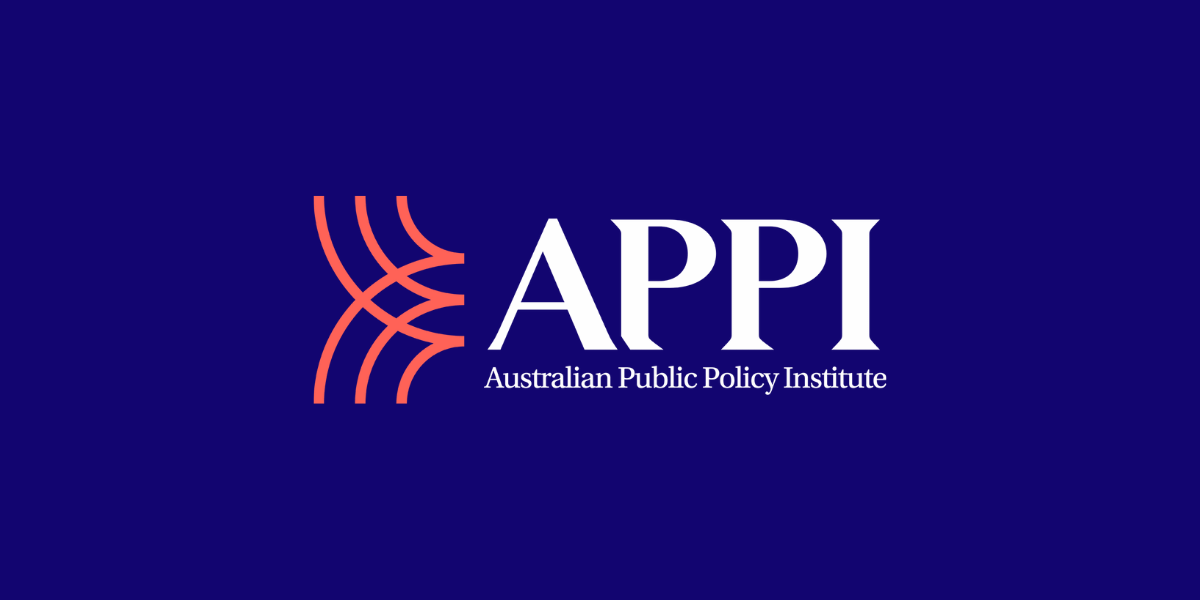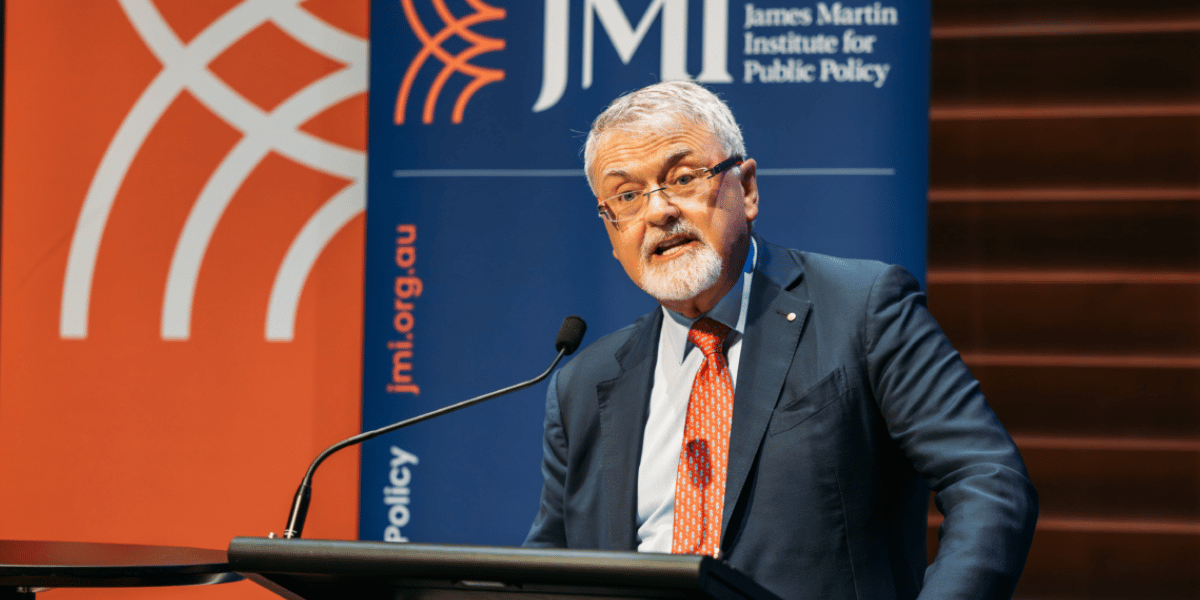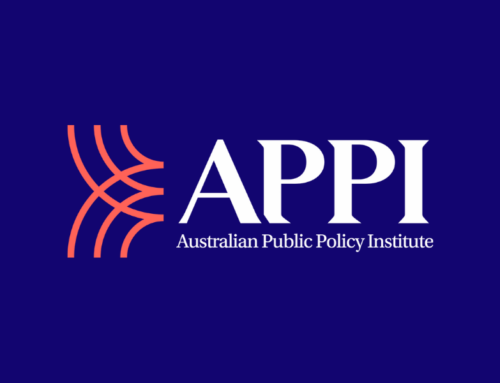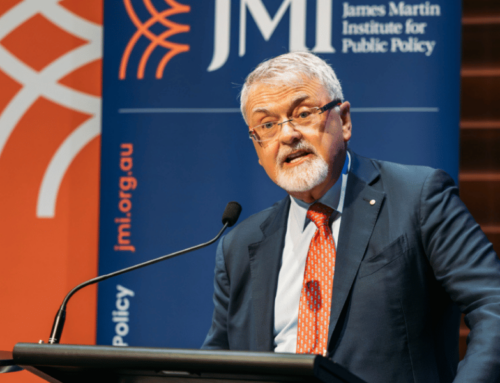Two hundred policy professionals and researchers gathered at UNSW Sydney on 2 August to explore ways to shape a more equitable future for Australia and forge networks of collaboration.
Marking JMI’s third anniversary, the JMI Policymaker Summit 2024 sought to advance practical policy opportunities to support intergenerational equity. The wide-ranging discussions touched on housing, energy, transport, education and economic policy, amongst others, with leaders in the field.
Professor Peter Shergold AC, Chair of the JMI Board, began the conference by outlining key achievements in JMI’s first three years and future objectives and areas of work in the years ahead. JMI’s CEO, Libby Hackett, said the full auditorium was a testament to the commitment of policymakers, experts, and public policy professionals to tackle multidimensional challenges head-on.
“We are delighted to bring together this incredible room of professionals here today to collaborate in tackling some of the key public policy challenges we are all facing,” she said.
Participants echoed this positive sentiment and the shared commitment to working together. “Intergenerational equity is ultimately about safeguarding our future,” said Professor Emma Johnston AO, Deputy Vice-Chancellor of Research at the University of Sydney. “It is inspiring to see so many experts and policymakers engage on critical and timely public policy issues at the JMI Policymaker Summit.”
“It’s clear that through more sustained and in-depth collaboration, we can chart positive ways forward to advance more equitable futures for all communities in Australia,” she added.
The program featured video messages from NSW Deputy Premier The Hon. Prue Car MP, NSW Minister for Planning, The Hon. Paul Scully MP, and Australian Assistant Minister for Competition, Charities, Treasury and Employment, The Hon. Andrew Leigh MP.
Early interventions for intergenerational equity
The first panel, moderated by Professor Nareen Young of UTS Business School, explored how early investments could promote greater intergenerational equity and pave the way for a more prosperous and inclusive economy. Panellists underscored the critical role that early interventions can play in addressing intergenerational inequality.
The Secretary of NSW Health, Susan Pearce AM, noted that with NSW’s population projected to exceed 11 million by 2061, the health system’s ability to perform well will be challenged if it does not continue to adapt. Recognising the diverse measures currently implemented, the Secretary underscored the vital role of prevention and reaffirmed the government’s strong commitment to continue advancing these services.

From left: Professor Nareen Young (UTS Business School), Dr Rhonda Itaoui (Centre for Western Sydney), Susan Pearce AM (NSW Health), Shane Hamilton PSM (Aboriginal Affairs NSW) and John Bush (Paul Ramsay Foundation)
Reflecting on the continued impact of the COVID-19 pandemic, the Secretary remarked that the pandemic had followed lines of entrenched disadvantage. “While we’ve seen improvements in health across our community, inequities persist, and there is still much more to be done.”
Shane Hamilton PSM, the Deputy Secretary of Aboriginals Affairs NSW, stressed the critical importance of acknowledging the traumatic impact of past policies on First Nations people and their families when devising new initiatives.
“When we think about early intervention and intergenerational equity, we must think about the ongoing trauma that Uncles and Aunts say is running through their blood into the next generation,” Hamilton said.
The session also included contributions from Dr Rhonda Itaoui of the Centre for Western Sydney and John Bush of the Paul Ramsay Foundation. Panellists explored various approaches to early interventions across different policy areas, including early childhood education and employment. Panellists highlighted the significance of long-term program horizons and noted that philanthropic organisations can play a critical role in driving meaningful change.
Setting the right policy directions for Australia’s economic growth
The second session, moderated by Dr Kar Mei Tang of the UN-backed Principles of Responsible Investment, focused on how policy could steer Australia towards a thriving, inclusive, and sustainable economic future.
Ryan Winn, CEO of Science & Technology Australia, highlighted the unprecedented pace of societal and technological changes. “Australia needs to be ready for those” and “lean into our strengths,” he noted.

From left: Dr Kar Mei Tang (UN-backed Principles for Responsible Investment), Barry Sterland (Productivity Commission), Sally-Ann Williams (Cicada Innovations) and Ryan Winn (Science & Technology Australia)
In this context, the CEO of Cicada Innovations, Sally-Ann Williams, proposed that Australia needs a deep tech economy driven by science—and engineering-based businesses.
“We need to have a laser-focused analysis of what is worth building here, what is worth investing in here, what is better done overseas… and think about it in a systemic way… There is a real role for government in this,” Williams said.
The panel, which also featured insights from Barry Sterland of the Productivity Commission, observed that the Future Made in Australia agenda represents a once-in-a-generation opportunity. However, they also identified several key areas for future focus that will be essential for success: enhancing strategic incentives for R&D investment, deepening the understanding of the non-linear trajectory of business innovation and commercialisation, exploring the role of procurement, and improving the coordination of initiatives across jurisdictions.
Innovative partnerships to build the infrastructure of tomorrow
In his video message, The Hon Paul Scully MP, NSW Minister for Planning and Public Spaces, emphasised that discussions of intergenerational equity must include considerations of housing accessibility and affordability.
“Infrastructure development, done correctly, can have a profound impact on long-term inclusive economic growth,” Minister Scully emphasised. “We are taking bold and proactive action in this regard,” he added, outlining several recent announcements and achievements in this area to the audience.

From left: Professor Ganna Pogrebna (Charles Sturt University), Sonya Campbell (NSW Treasury), Anthony Lean (NSW Department for Climate Change, Energy, the Environment and Water), and Associate Professor Amelia Thorpe (UNSW)
The third panel, moderated by Professor Ganna Pogrebna of Charles Sturt University, delved deeper into the role of partnerships in leveraging future-ready infrastructure. It explored how collaborative efforts could drive the development of infrastructure that meets evolving societal needs.
The discussion prominently focused on strategies for involving and partnering with local communities directly affected by large infrastructure projects. Anthony Lean, Secretary of the NSW Department of Climate Change, Energy, the Environment and Water, emphasised the critical importance of earning the trust of the local community.
Reflecting on a recent visit to Mudgee, located in one of the state’s Renewable Energy Zones, he underscored the need for close collaboration with all stakeholders and a thorough understanding of the project’s complexities to ensure it delivers tangible benefits to communities on the ground.
The panel, which also included Sonya Campbell, Deputy Secretary – Commercial at NSW Treasury, highlighted creative solutions to addressing infrastructure needs, harnessing technological advancements, and tackling environmental challenges, including through research partnerships with the private sector. Associate Professor Amelia Thorpe offered her JMI-supported project on “Harnessing data for inclusive and sustainable mobility” as one such example.
Creating a collaborative network to transform public policy
In his remarks, UNSW Vice-Chancellor and President, Professor Attila Brungs, acknowledged education as a critical element of intergenerational equity and thanked JMI for its role in fostering deep collaboration across sectors.
“Universities are extraordinary assets, but our whole society, the skills they have, the way they interact, is an extraordinary asset; and what JMI does is bring all of that together. So, congratulations on your extraordinary work over the last three years,” Professor Brungs said.
“JMI is a truly distinctive organisation; created by government, for government, arm in arm with our university sector for the public good,” Minister Scully said. “It’s a success story of collaboration, and we’re proud that it was established here in NSW.”
The networking part of the event included a Policy Impact Exhibition showcasing the work of leading policy institutes and for-purpose organisations that develop solutions to advance intergenerational equity.

Researchers from the University of Wollongong's Early Start initiative during the Policy Impact Exhibition
The exhibition featured the Australian Policy Observatory (APO), the Australian Centre for Evaluation, the AI and Cyber Futures Institute at Charles Sturt University, the UTS Centre for Social Justice and Inclusion, the University of Wollongong‘s Early Start initiative, UNSW‘s Social Policy Research Centre, the Sydney Centre for Health Society and the Urban Transformations Research Centre at Western Sydney University.
JMI is grateful to UNSW for hosting the Policymaker Summit, our government and university partners, and all our expert speakers and guests for participating in this collaborative effort to transform public policy in Australia.
Sign up for our newsletter here to keep up to date.
Image Credit: Orlando Sydney Corporate Photography / James Martin Institute for Public Policy








